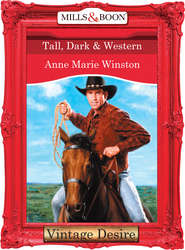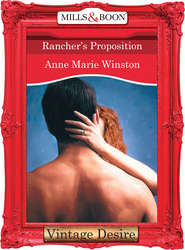По всем вопросам обращайтесь на: info@litportal.ru
(©) 2003-2024.
✖
Billionaire Bachelors: Garrett
Автор
Год написания книги
2018
Настройки чтения
Размер шрифта
Высота строк
Поля
He drove back into the city in early evening, thanking the long hours of daylight that kept him from making the journey in the dark. This time when he knocked, the inner door opened almost immediately.
“Miss Birch,” he said before she could speak, infusing his tone with more warmth than he felt, “I apologize for the insensitive way I broke the news of Robin’s passing. It’s been a difficult time. May I come in and talk to you for a few moments?”
She hesitated. He couldn’t see her clearly through the screen, but she’d obviously changed clothes. Now she wore a sleeveless denim jumper with a short-sleeved top beneath. Her hair was still pulled up, but now it was in a tidier, thick ponytail that bounced behind her head. To his great relief, she pushed open the door. Wordlessly she turned and retreated into the house, leaving him to catch the door and follow her.
The room he entered was a living room, furnished with comfortably overstuffed furniture in a faded flower pattern, threadbare but clean. The small space somehow managed to look uncluttered and on the one sizable wall there was an unusual collection of hats. Old hats. Elegant, vintage hats.
She shut the door behind him and he heard the hum of an air-conditioner cooling the small half-house.
He raised one eyebrow and turned to her, forcing himself to ignore the leap of his pulse at the porcelain beauty of her features. Indicating the headgear displayed on the wall, he said, “You like hats, I take it?”
She nodded. “I went through a stage where I collected them. Those were a few of my favorites that I decided to keep when I sold the rest.” She waved a hand toward the sofa. “Please, have a seat. May I get you a drink?”
If this were any other occasion, he’d have been amused by her scrupulous manners. He shook his head. “No, thank you.” He took a seat on the far end of the couch, expecting her to join him, but she went across the room and sat in a rocking chair.
“Thank you for seeing me,” he said, though it grated that he had to be so civil. “Have you given any more thought to what I said about listening to the reading of the will?”
“I don’t care about the will,” she said tonelessly. “But I’d like to know where he’s buried so I can visit the—the grave.”
Right. And he was a little green man. “I care about the will,” he said, watching her closely, “since it involves me, too.”
“You can have everything.” Her accent was even more obvious as she clipped off the syllables, and she met his eyes without even a hint of guile. She was good; he’d have to give her that. “I’ll sign anything you wish.”
“Believe me, I’d like nothing better,” he told her curtly, abandoning his attempts to mollify her. What an act. “Unfortunately it’s not that simple. We both have to be present for the reading of the will.”
“Why?” she demanded.
He opened his mouth to answer her, but a hissing sound and a movement from his peripheral vision distracted him. Glancing over, he caught sight of a striped blur streaking up the stairs. “What’s that?” he said, startled, though he was pretty sure the animal had been a cat.
“It’s my cat. She’s not very friendly yet.”
“Yet?”
“I found her lying on the road. Someone hit her and drove away. She was still alive when I finally got to a veterinary clinic. So when she was well enough to come home, I brought her here. She’s good company.”
“She doesn’t seem overly tame.”
“She was wild, I think.” Ana Birch’s face had lost its impassive mask; her eyes brightened and she became more animated as she spoke of the animal. He felt an unwilling tug of attraction; she really was a beautiful woman. “But she’s getting used to me.”
“Why didn’t you just let her go where you found her if she’s so wild?”
“She needs seizure medication. She was struck in the head and the vet thinks the damage may be permanent. Besides, she’s missing half her teeth on one side and she can’t eat anything but very soft foods with any ease. She probably wouldn’t survive outdoors.” Then the soft loveliness faded and her features became set and unreadable once again. “So why is it so imperative that I attend this will-reading ceremony or whatever one calls it?”
He shrugged. “That’s the way Robin wanted it. He set it up with his lawyer and I’ve spoken with the man. He refuses to divulge anything unless we’re both present.”
She was frowning at him, her light brown eyebrows drawn into a slanting scowl. “So if I refuse to attend, you get nothing? Is that how it works?”
“Probably,” he told her, though he was certain of no such thing.
“That old rotter,” she muttered.
“I beg your pardon?” he said, startled.
“He knew I wouldn’t want anything. He knew I’d refuse, so this way at least I have to hear what he wanted me to hear or you’ll lose your inheritance, too. And he knew I wouldn’t let that happen.”
An unexpected pang of pure green-eyed jealousy squeezed his heart. There was no doubt in his mind now that whatever their relationship, she’d known—and understood—Robin quite well. Masking his thoughts behind an impassive expression, he focused on the only thing that mattered. “So you’ll come?”
She sighed. “I suppose. When and where?”
When Ana arrived the next morning, Robin’s stepson was already in the lawyer’s waiting area. He stood with his back to her, looking out the far window as Ana came down the hall, and she observed him through the plate glass of the office front before she entered.
The set of his shoulders looked as rigid as the man’s attitude. A lump rose in her throat as she thought of how certain Robin had been that Garrett would welcome her to the family. It was the only time in the short few years she’d known Robin that he’d been so completely wrong about something.
Robin. She tilted her face up to contain the tears that wanted to escape.
She couldn’t believe her father was gone. They’d had so little time together. Oh, she’d known he was older than he looked. In fact, she’d been shocked when he’d told her his age on his last birthday. He had been seventeen years older than her mother. She knew her mother had been more than thirty when they met, which would have made him in his late forties. A large disparity, but at those ages, still quite plausible.
Perhaps they had finally found each other again, her father and her mother. And that thought, strangely, calmed her as nothing else had.
She glanced again at Robin’s stepson, technically her own stepbrother, she supposed and as she did, he turned and saw her. When their eyes met, a small zing of awareness exploded along her nerve endings. She’d felt it the first time he’d come around, and the second. But now, as then, she’d brushed it away. So what if the man was attractive? He’d proven his beauty to be no more than skin-deep with his nasty attitude. Still, she couldn’t help wishing they’d met under different circumstances.
The sense of loss she’d felt since he’d told her of her father’s death intensified as she thought of the day he’d come to her house. For months, she’d imagined the day that Robin introduced her to Garrett. She’d built comfortable, civilized little images of a brotherly type, of the three of them sharing holiday dinners and warm, informal get-togethers.
She had never imagined that the first time they’d meet would be under these circumstances. She still couldn’t accept that she’d missed Robin’s funeral.
And Garrett couldn’t be less brotherly if he tried. He’d been so curt and obnoxious yesterday that she’d wanted only to ignore him and hope he’d go away. And to top it all off, she’d nearly fainted like a ninny and when he’d tried to help she’d acted like a skittish virgin. Could this get any worse?
That was probably spitting in the eye of fate, she decided. For the sake of Robin’s memory, she was going to try her very best to get along with Garrett.
Though they hadn’t been related, he actually looked more like her father than she did. And her father had been a handsome man. Garrett’s hair was dark, cut short and severe, and his face was long and leanly molded. He was dressed in an expensive-looking black suit and she suddenly realized that he strongly resembled the most recent actor to portray James Bond in the movies. Unfortunately the resemblance didn’t carry over to personality. Garrett’s stormy blue eyes regarded her with distinct animosity, and she wondered again what on earth she could have done to make him dislike her. As far as she knew, Robin hadn’t told him about her yet at the time of his death.
She wasn’t going to let his attitude cow her, though. He’d insisted she attend this ridiculous will-reading—how archaic was that, anyhow? Why couldn’t the lawyer simply have called her and told her whatever was so important? Garrett didn’t appear even to have considered the fact that she might have to work, or have plans of her own.
In fact, both were true. She had the day off from her job as a teller at a local bank, although she did have to work this evening at the restaurant where she was a waitress. But she had planned to work today anyhow, in another sense.
Two days ago, she’d received a call from the agent who had approached her about doing a book on the history of hats after she’d given a lecture at a local college’s textiles fair. The man had an editor at a New York publishing house who was very interested in seeing her ideas for the book.
The phone call had left her buoyant and giddy, although frustrated and apprehensive at the same time. She’d been thinking about the project ever since—and that’s about as far as she’d gotten.
It drove her crazy that she had so little time for anything other than simply making ends meet. Since her mother’s death three years ago shortly after Ana’s twentieth birthday, there had been more bills to pay and less time for designing the line of hats and handbags she’d started. Almost none, in fact.
Her accessories currently were sold at two exclusive boutiques in the Baltimore area and both retailers had told her they could sell anything she could give them. Some days her fingers itched for a pencil and a sketchpad when she was struck by yet another idea or theme for her unique creations. Invariably she was in the car on the way to work, or counting money, or carrying plates of food to a table when it happened. She didn’t know how she was going to do it, but she was determined to find more time to design and sew. If she had the smallest hope of becoming a serious artisan, even making a living from her work, she had to produce more. Acquire wider recognition.
Publishing a book would certainly help with that goal if she could find the time to fit it in.
She could have worked this morning. And yet, here she was, stuck in an office with a man who couldn’t stand her. The feeling was rapidly becoming mutual.
He strode toward the door before she moved to open it, yanking it wide. “Come in. We’ve been waiting for you.”











